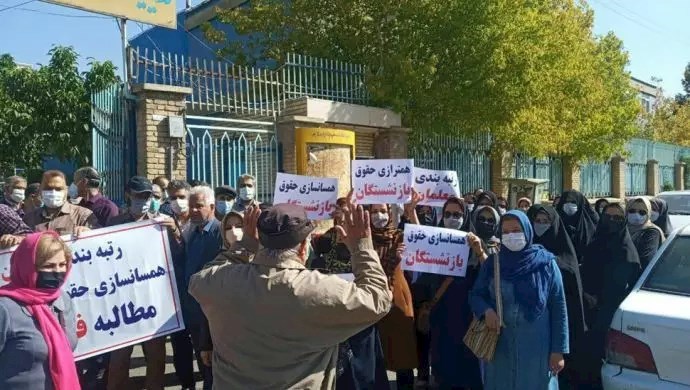Analysis by PMOI/MEK
Iran, November 1, 2021—The regime has proved once again that it has no regard for the livelihoods of millions of Iranians and the future generations of Iran.
In Sunday’s session, the regime’s MP refused to pass a bill that would adjust the official salaries of teachers. For the second time, the Majlis refused to vote on the bill that would provide a 25-trillion-rials to the ranking of teachers. The bill was returned to the education commission for revision.
The decision comes against the backdrop of months of ongoing protests by teachers across Iran, who have been raising their grievances with the education ministry and different government institutions. Iran’s teachers are struggling to make a living with salaries that are about a third to a fifth of the poverty line.
Interestingly, the Sunday session of the Majlis was held in private. It is not clear why such an important issue that regards the general public must be held behind closed doors. Do the teachers want anything other than their most basic rights and a decent living?
According to MP Alireza Sefidan, member of the education commission, by passing the ranking bill, the regime would have to pay all teachers an extra 30 million rials per month and teachers with a master’s degree with an additional 70 million rials. The regime would have to fit this salary into a budget that already has a 450 trillion rial deficit. According to the industry, mines, and trade ministry, doesn’t have any source of income to fill 307 trillion rials of this gap.
This, of course, is a big lie. If the regime stops funneling money to the Assad regime in Syria, the Hezbollah in Syria, the Houthis in Yemen, and the Hashd Al-Shabi in Iraq; if it stop squandering billions of dollars on developing ballistic missiles; and if it stops its pursuit of nuclear weapons, it will have enough money to solve not only the problems of teachers, but also those of workers, retirees, nurses, and other segments of the society.
That of course, would be a hard decision for a regime that has built its power on spreading terrorism, violence, and Islamic fundamentalism across the region and repressing any form of dissent through arrests, torture, and executions.
But the regime’s decision to kick the can down the road and refrain to address the grievances of teachers will not be without repercussions.
Iran’s teachers have been protesting since last year, but the regime has refrained from addressing their demands. As the start of the academic year neared, the teachers returned to the streets to resume their protests and remind the government of its duties.
The latest round of protests has been ongoing since early September.
The protesting teachers are demanding regime authorities implement what is known as the "80 percent ranking plan” regarding the teachers’ salaries.
"The government and parliament are obliged to approve this initiative. If this initiative is approved and implemented, the legal basis for teachers’ wage will be at least 80 percent of that of faculty members, because teachers and members of faculty boards should be receiving equal salaries," the Iranian Teachers Coordination Council said in a statement the beginning of the new school year.
The regime’s continued disregard for the needs of teachers and its repressive response to their demonstrations has gradually skewed their demands and rallies into political protests. One of the slogans that has become very common in rallies by teachers is “Imprisoned teachers must be freed.”
This is a trend that can be seen across other segments of the society that have been holding protests despite the environment of repression and the regime’s continued disregard for their demands.
The regime’s own media are warning about the consequences of not addressing the economic grievances of teachers and other communities.
“These days, teachers’ names have been tied to livelihood problems, and we are witnessing a wave of protests by teachers in response to livelihood and living conditions problems across the country. And the government can’t overcome this crisis with band-aid responses and keeping the lid on the main demands [of the teachers],” the state-run Mostaghel newspaper wrote earlier in October.
“The security apparatus tries to stop the protests through pressure, but so long as livelihood problems are not solved, we will continue to see these protest rallies,” Mostaghel warned.





